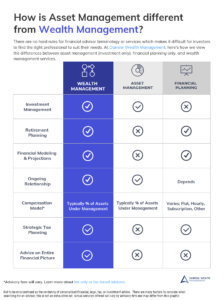What is a fiduciary financial advisor and why do you need one? A full-time fiduciary financial advisor has a legal obligation to act in the client’s best interests. Anyone can say they’re a financial planner, so it’s important to understand the terminology and different standards when looking for an advisor. Registered investment advisors are the only type of advisor always held to a fiduciary standard.
What is a fiduciary financial advisor?
A fiduciary duty is a legal requirement to act in a client’s best interest. This is the highest standard of care under the law. A registered investment advisor is the only type of financial advisory firm required to act as a full-time fiduciary.
Not all advisors are fiduciaries. Stockbrokers, registered representatives, dual registered advisors, insurance agents, and other types of advisor-sales roles don’t always have to act in your best interest depending on the situation.
Non-fiduciary financial advisors can operate under the suitability standard, which allows the advisor to make recommendations they deem ‘suitable’ for the client’s personal financial situation. In another words, the hurdle is that the recommendation is merely suitable, even if it’s not in the client’s best interest.
Hybrid firms can switch between their status as a registered investment advisor and brokerage, which can be problematic for individuals seeking financial advice; wearing multiple hats makes it difficult to know when your advisor is acting as a fiduciary if circumstance requires it.
Is my financial advisor a fiduciary?
Only registered investment advisors are always a fiduciary for their clients. Other types of financial advisors may have to put your best interests first in some situations, but not 24/7. When a financial advisor isn’t prioritizing your best interest, how can you trust the advice?
5 Ways to Find a Fiduciary Advisor
The title your advisor may use on LinkedIn or their website may not tell you much. There are many titles financial advisors use: investment advisor, money manager, financial planner, financial consultant, and wealth advisor are a few. Unfortunately, none of these professional titles help determine if the advisor has a fiduciary responsibility. Look to see if the firm is a registered investment advisor.
Fee-only financial advisors don’t sell products
A fee-only financial advisor is only paid by their clients, typically as a percentage of assets under management (AUM). They do not sell financial products (like insurance or mutual funds) or receive commissions. Fee-only advisors also don’t accept compensation from third parties, like referral fees or other sales revenue.
How to Find a Fee-Only Wealth Manager
Fee-based advisors usually charge clients as a percentage of assets under management too. But they also receive commissions for selling financial products and securities to their clients. The commissions on these products can be substantial which can create concerns about conflicts of interest. This type of advisor can also receive referral fees and other third-party revenue.
A fee-based fiduciary?
Many fee-only financial advisors are registered investment advisors (i.e. fiduciaries). However, it’s possible for a fiduciary to sell products as a fee-based advisor or create a separate entity to handle this type of business. Typically, when investors are searching for a fiduciary, they’re looking for a fee-only registered investment advisor.
Darrow Wealth Management is proud to be:
-
- A full-time fiduciary
- Fee-only
- Independent
- Women-owned
- Registered investment advisor
- CERTIFIED FINANCIAL PLANNER™ professional advisors, CFA, CPA









